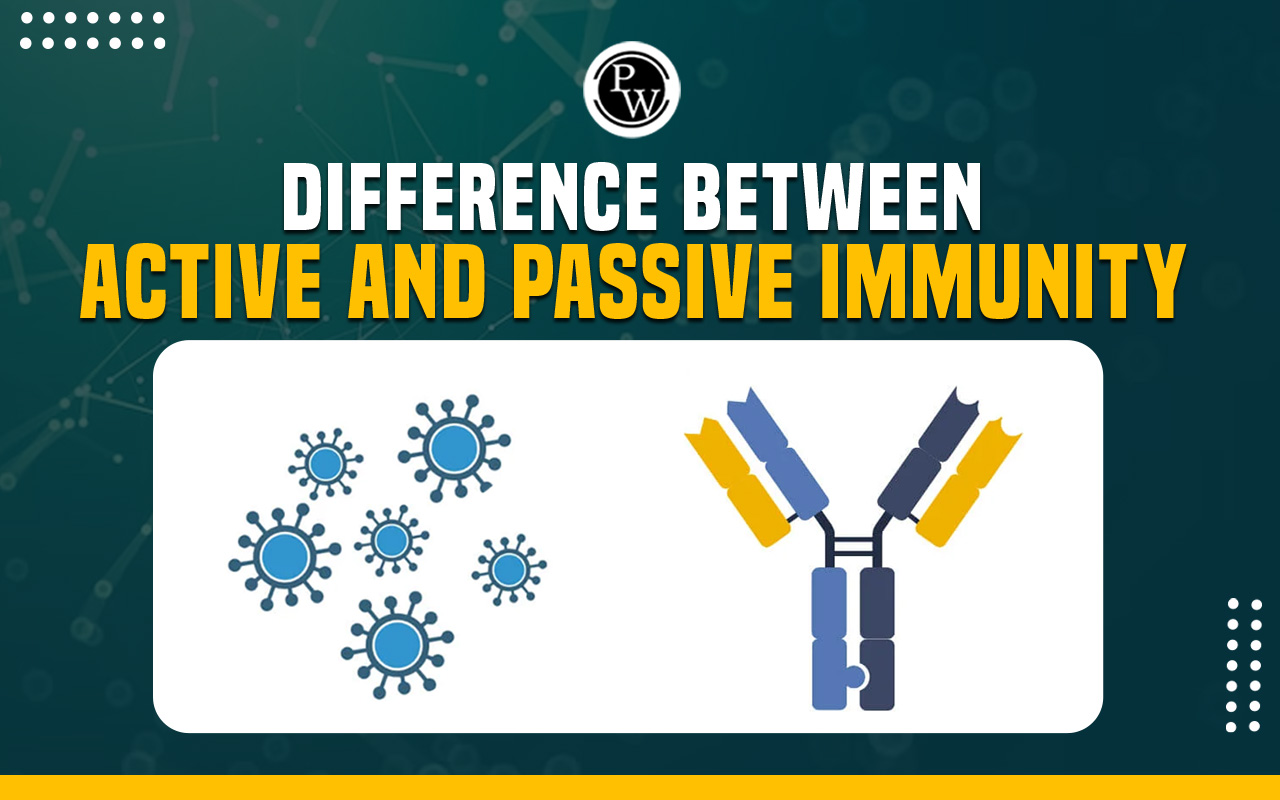
Difference Between Active and Passive Immunity: Active and passive immunity are essential in the defense against infection. Active immunity involves the host’s immune system responding to pathogens, creating a long-lasting shield. Passive immunity, on the other hand, provides immediate but temporary protection by transferring preformed antibodies.
This article explains the complexities of these immune responses. Read this article for complete details about the difference between active and passive immunity.
| NEET Biology Syllabus | NEET Biology Diagrams |
| NEET Biology MCQ | NEET Biology Chapter wise Weightage |
| NEET Biology Notes | NEET Previous Year Question papers |
Difference Between Active and Passive Immunity Overview
Active immunity is a dynamic defense mechanism in which the host's immune system responds to antigens, produces antibodies, and establishes long-term memory. This self-activated protection is frequently achieved through vaccination. Passive immunity involves the immediate but temporary transfer of preformed antibodies or lymphocytes. It provides instant protection without the host's active immune response. Passive immunity is naturally or artificially acquired through medical procedures such as antibody injections.Difference Between Active and Passive Immunity
Active immunity involves the host's immune system responding to antigens. It produces antibodies and establishes memory. In contrast, passive immunity entails the direct transfer of antibodies or lymphocytes. The complete difference between active and passive immunity is given below in the table.
| Difference Between Active and Passive Immunity | ||
| Basis | Active Immunity | Passive Immunity |
| Meaning | It refers to protective immunity, where the individual's immune system is stimulated to produce antibodies and lymphocytes. | It refers to immunity, where one receives antibodies or lymphocytes directly from another individual's immune system. |
| Production | It is actively produced by the immune system of the host through exposure to antigens. | It is passively produced by the host's immune system. The antibodies or lymphocytes are received without the host actively generating them. |
| Antibodies | It is induced by infection or immunogens and actively produced by the host's immune system. | Antibodies are not produced by the recipient. They are directly transferred from another individual or source. |
| Immunological Memory | It is created and results in the ability to recognize and respond more efficiently upon subsequent exposure to the same antigen. | It is not created and leads to no immunological memory for the specific antigen. |
| Antigen | It requires exposure to a pathogen or the antigen of a pathogen to trigger the immune response. | It does not require exposure to an infectious agent or its antigen. |
| Immunity Type | It involves both humoral and cell-mediated immunity and provides a comprehensive defense against pathogens. | It confers immunity only through readymade antibodies and offers a limited range of defense mechanisms. |
| Artificial Acquirement | It is achieved through vaccination and stimulates the host's immune system to produce a response. | It is administered by introducing preformed antibodies into the recipient. |
| Lag Period | It is present, as it takes time for the immune system to mount a response upon exposure to an antigen. | It is absent, as immunity is immediate since preformed antibodies are directly provided. |
| Durability | It is durable, as the immune system retains memory and can respond rapidly upon re-exposure to the same antigen. | It is transient, as the immunity is temporary and wanes over time without the ability to generate a memory response. |
| Negative Phase | A negative phase is present, as the immune system may exhibit a temporary negative reaction during the initial response. | It is generally absent, as preformed antibodies are administered without stimulating the recipient's immune system to produce them. |
| Protection | It offers effective and versatile protection against a wide range of microbes. | It is less efficient in providing complete protection, as it relies on the specific antibodies received. |
| Side-Effects | It is generally associated with minimal side effects, as the immune response is natural and controlled. | It may cause reactions, as the recipient may exhibit sensitivity to the administered antibodies. |
Active Immunity
Active immunity refers to the body's quick reaction to pathogens. It is also triggered when exposed to a foreign antigen, the antigen found in bacteria. It may also relate to a person's adaptive reaction to a particular sickness or antigen exposure. It may also appear naturally or as a result of immunization. Active immunity is made up of T cells, B cells, and antigen-presenting cells. It also involves antibody creation in response to infection or an immunogen.
Passive Immunity
Passive immunity is immunity conferred by an individual through transmitting serum or lymphocytes. They also catch it from a very immunized person. Furthermore, it is a convenient way to give resistance without waiting for the active immune response to emerge. Furthermore, passive immunity does not require prior exposure to a disease pathogen. It takes effect instantly and without delay. It is only present for a short period. The antibody is produced in passive immunity without the involvement of immune cells. NEET Online Coaching is the way to go for the best NEET Exam preparation. Physics Wallah provides the best NEET online coaching for aspirants. The PW NEET Online Coaching Program offers students the best and most affordable courses. The best faculty for the NEET Exam is available to you with the best online courses for the NEET. The live and affordable NEET online coaching will prepare you for the most prestigious medical exam.













